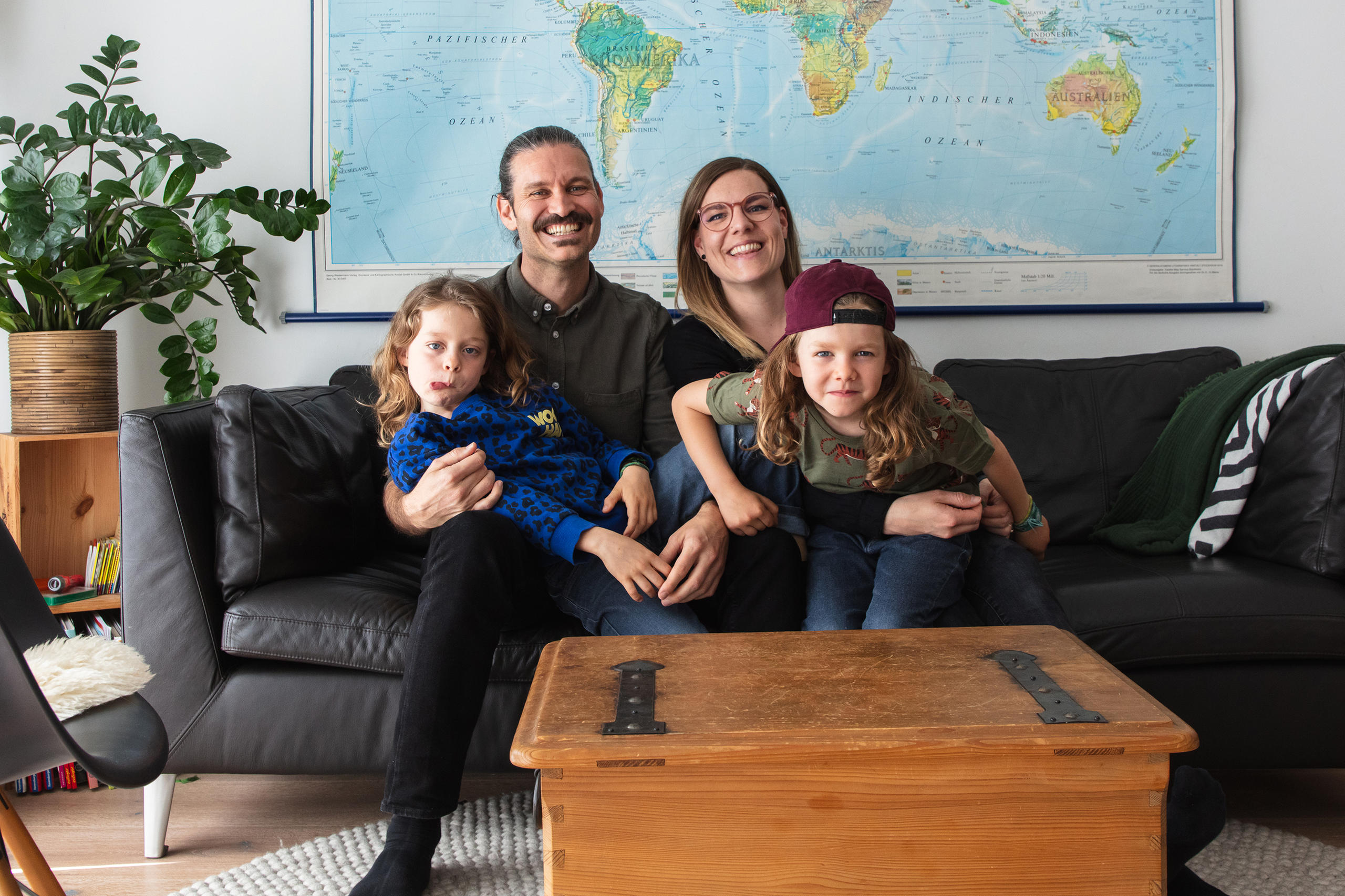Emigrating with family: what to do if a child doesn’t want to move

New surroundings, new school, new friends – emigration can be a daunting prospect for children. Two experts share their tips.
You dream of a pleasant climate, a new culture, surfing every day or a highly attractive career move. Your daughter, on the other hand, is crying bitter tears. You may be looking forward to your new life abroad, but she may not feel the same way.
In our Guide to Moving Abroad you will find further tips for emigrating from Switzerland and the life abroad.
Emigration is usually an exciting new chapter for parents, but it can be a big problem for children at first. These 13 steps may help when emigrating with children in tow:
1. Involve everyone in the decision
“Call a family meeting,” recommends Claudia Doron, a professional relocation coach. It is important to include the children in the process right from the start, she says, even if the decision cannot always be made together for various reasons, “after all, a new chapter in a distant place impacts everyone”.
2. Be open about worries and fears
You should be prepared for the fact that your children – depending on their age – may initially react negatively to the plans. “Tears may well flow,” says Doron. Show understanding and patience. While parents often want to realise a lifelong dream by emigrating, for the children, a move first of all means saying goodbye.
3. Take your children seriously
“Listen carefully and make a note of your children’s objections and concerns,” suggests Claudia Roebers, professor of developmental psychology at the University of Bern, who herself emigrated to Switzerland from Germany with her family. “Simply ending the conversation if there is resistance and saying things like ‘Dad has a great career opportunity abroad and you just have to grit your teeth’ are toxic,” she warns.
Certain misgivings about emigrating with children are not unfounded, especially among teenagers. A long-term study by the University of Manchester showed that relocations had a particularly negative impact on the mental health of 12- to 14-year-olds. “At this age, you are heavily reliant on relationships outside the family and already experience a lot of uncertainty in everyday life,” says Roebers. In addition, young people have put down roots at home and may also be close to their grandparents. “If a teenager is then torn away from their familiar surroundings, it can have consequences.”

There are also school and language challenges to consider, Roebers points out. “Children can be set back by emigration. They find themselves in a vacuum, in terms of performance but also socially and emotionally, and how quickly they find their way out of that is different for every child and teenager.”
It is usually easier for children under ten. Their parents are their main points of reference, and they quickly make new friends. But even this situation shouldn’t be seen through rose-tinted glasses. “When you move, something shifts within the family dynamic. Familiar structures and securities fall away, support networks are cut – more so the further away you move – and others are created. Every individual has to reorient themselves,” says Roebers, who adds that there can be both winners and losers.
4. Try to cushion the impact of any problems
Recognise fears, seize opportunities: to make emigrating as child friendly as possible, it can help to work together to find solutions that make the transition easier. This could mean, for example, keeping in touch with friends in Switzerland and negotiating certain compromises. “Perhaps the children can be allowed to invite someone to their new home for one week every year or play games online together regularly,” Roebers says.
Annual or six-monthly visits to Switzerland also allow children to maintain their social circle in their home country. It is important to respond to the individual needs of each child. “Some, thanks to their open nature, socialise quickly and may have different worries and concerns than their introverted siblings,” says Roebers.
5. Provide things to look forward to
Is your daughter a talented dancer? Show her what’s on offer at the great local dance school so she has something to look forward to. Or has she been dreaming of playing rugby for a long time but never got around to it? There might be a team in her new neighbourhood. This way, the excitement could become greater than the pain of saying goodbye.
6. Explore your new adopted country
Plan a trip together to the potential destination to explore the area. “Design your stay to be as entertaining as possible, like a family adventure,” Doron recommends. Before you get there, films, books or home-cooked traditional dishes can build excitement for your potential new home.

7. Be flexible
Depending on their age, your children’s educational path may be interrupted at a critical point. In such cases, it may make sense to reconsider the move or have the teens move in a little later. “One option could be to postpone the move or for the child to move in with their grandparents for a year so that they can complete their schooling in familiar surroundings,” says Roebers.
She adds that it is crucial that such decisions are not made above their heads. “Ask questions and listen to your child’s needs.”
8. Enrol your children in a language course
Once the decision to move has been made, children should start learning the language of their new home country as soon as possible. Language is key to integration and helps them settle into their new environment and feel at home more quickly.
9. Contact the new school
Ask the school to send you an overview of the curriculum so that your child can prepare. It also helps to establish a dialogue between the child and the teacher: would they prefer to sit at the front or back of the classroom, would a seat next to a particularly open classmate help, or would it be a good idea for the teacher to tell the class something about Switzerland on their first day? “Even the little things can make the familiarisation process easier and give the child a sense of security,” says Doron.
10. Let your children design their new room
This builds excitement and allows the children to take an active role in the move. Ideally, furnishing this room should be a top priority. That way, your children will have a comfortable space straight away.
11. Allow freedom when packing
It can help very young children to pack their favourite toys in their hand luggage. Having something familiar with you when travelling provides security.

More
Advice for Swiss families moving abroad
12. Help with integration abroad
Get involved in the process of making new friends and support your children in establishing those new relationships. Organise play dates for the younger ones. If your teenager is finding it difficult to make new friends at school, offer to take them to a new sports class or youth group.
Alternatively, you can seek contact with other Swiss Abroad and their families who can share their experiences of emigrating with children. Connect with other Swiss Abroad via the Organisation of the Swiss Abroad (OSA)External link or various Facebook groups such as ‘Swiss People Living In The USAExternal link’ or ‘Swiss in GermanyExternal link’.
13. Give your children time
Children are faced with a lot of new things during this time. Be accommodating if difficulties arise and give them time to settle in properly.
Here are some helpful books (in German) on the subject:
- Wir ziehen um! (We’re moving!) by S. Barroux und Alice Brière-Haquet
- Auswandern mit Kindern: Gut planen – Traumziel erreichen (Emigrating with children: Plan well – reach your dream destination) by Uta Müller
- Ins Ausland mit Kindern und Jugendlichen (Travelling abroad with children and teenagers) by Rolf Daufenbach and Andreas Bittner
Experiences from other parents
Find out how a Swiss family relocated to Thailand and what they learnt after four months in their new home.

More
Switzerland to Thailand: what it takes to move a family across the globe
Emigrating with school-age children
In this article you will find lots of helpful information on administrative challenges, especially for emigrating with school-age children.

More
2nd Life – Off to Tokyo
Edited by Balz Rigendinger
Adapted from German by Katherine Price/ts

In compliance with the JTI standards
More: SWI swissinfo.ch certified by the Journalism Trust Initiative

















You can find an overview of ongoing debates with our journalists here . Please join us!
If you want to start a conversation about a topic raised in this article or want to report factual errors, email us at english@swissinfo.ch.